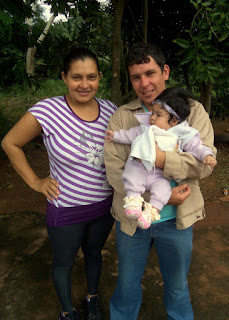5-24-13
Three days after leaving Paraguay I´m in a town called Cafayate, south of the city of Salta, Argentina. This is wine-country, a high desert valley watered by mountain runoff. The mountains rise steeply rfom the valley floor and seem to come in all shapes and colors and forms imaginable. The town is tidy and peaceful, with many tourists, and is surrounded by wineries.

Yesterday I stayed in Salta, which is a lovely, sophisticated city. There are many differences between this part of Argentina and Paraguay, 800 desolate kilometers away, but what struck me most profoundly was the sophistication, the civilization even (if civilization is a measure of how good a group of people is at living in cities) of the urban culture, which could not be more different from Paraguay. In the beautiful central plaza, surrounded by interesting and historic buildings, with hundreds of pedestrians passing in all directions I was struck by the near silence of it all. There were hardly any motos, the buses do not roar like semis, many of the streets around the plaza are only open to foot traffic, there weren´t even any barking dogs. The city operates with a casual, elegant earnestness.

Between here and there lies the vastness of the Chaco. As we were crossing it the night of the 22nd, I could still see Paraguayan culture in the items for sale in the lonely little towns where we stopped. Here, though, Paraguay is completely absent, except in the practice of drinking yerba mate.I keep wanting to speak Guarani with people and being disappointed.
5-25-13
It was not so easy to get out of Paraguay. I think I was reasonable in not expecting it to be so difficult, but I´ve always been bd at these sorts of things. I was in Guarambare last Saturday night and Sunday, visiting the Benitez family one last time, then I came into Asuncion last Monday to complete my paper-work and swear out as a Volunteer. My phone broke on Saturday, making it hard to make those last goodbye calls, and I started having major gastro-intestinal issues Sunday. Peace Corps service doesn´t end without a fight.

I spent Monday morning trying to figure out how to get my readjustment allowance check into my bank account. With dad´s help, and at a cost of about 200$ I got that taken care of by about noon. I swore out Monday afternoon, turned in my broken phone, and stayed the night in my favorite hostel. Tuesday I went shopping for gifts for my family, which went well, and met Ellie and her fianceé Alexis in the plaza for tereré one last time. We got a good Paraguayan lunch in a nice little place frequented by working Asuncenos. One of the things I like about hanging out with Ellie and Alex is that they live in a much more Paraguayan way than most vounteers, because, well, he is Paraguayan. I could always count on an inviation to a hearty hot lunch when I was in Encarnacion, and here in Asuncion, instead of going to the same touristy/fancy restauarants that volunteers always go to they had sought out an authentic Asunceno lunch place as a matter of course. They will be married in the states as soon as they can get the paperwork processed.
I headed to the office to pack and ship a suitcase of things I didn´t want to take with me on my travels, and to finally pay my 170$ Argentine entrance fee (which was a pain in the ass, also). Once my suitcase was ready I went to DHL to send it. I expected a cost of $200 or so, hopefully less. I was told that it would cost no less than $600 to ship my 20kg suitcase home, and that was if I took out my laptop. Stunned, I returned to the office again by taxi. Generous as always, Ellie and Alexis agreed to carry my suitcase home with them on the plane and ship it from Tennessee, saving me about $430. I dropped off the suitcase with them to the bus terminal to buy my ticket to Salta.
I had inquired the week before about going to Salta and there hadn´t been any problem, I was told that buses head there at 9am daily. However it seemed that the Argentine bus companies had changed thier schedule, or that Argentina had changed its clocks, and that the connections no longer worked. After about half an hour we cobbled together an itenerary with two layovers with the second of which only 10 minutes, meaning I could easily be stranded in Formosa if the bus from Clorinda were late.
True to form I overslept slightly Wednesday morning. Granted, I no longer had a phone with an alarm clock, but I should have asked someone else to set an alarm to wake me. I got confused by the city buses one last time and arrived at the terminal frantic and wet from the rain 5 minutes after my bus to Clorinda was scheduled to leave. I hired a taxi to chase it down, and after about 15 minutes we caught up to the bus somewhere in the northern sprawl and I was able to board, relieved.
Arriving in Clorinda I had a hell of a time convincing the customs agents that it was fine that I have two passports: a peace-corps one (which I used to leave Paraguay and will not use again) and my old, regular one (which I used to enter Argentina). Fortunately it was not my Clorinda layover that was tight.
Clorinda was dismal, grey and muddy in the rain. I changed my Guaranies to Pesos with one of the many street corner money changers after searching about an hour for a proper
Casa de Cambios and stocked up on bread and fruit for the long trip across the Chaco. So far things looked about the same as the other side of the river, but there were more bicycles and donkeys (I don´t think I ever saw a donkey or mule in Paraguay) and fewer motorcycles. The schools looked nicer. Though my bus left 20 minutes late from Clorinda we arrived at the large, clean terminal in Formosa with plenty of time to spare.
 |
| Clorinda, Argentina |
During the night we stopped in many tiny towns in the Chaco. They all followed the same plan, a large double avenue with a park down the middle, turning off the highway to the south. Streets gridded out from the central avenue. The investment by the federal government was obvious in these otherwise poor, isolated towns. Around 11pm the bus stopped on the highway. There was a torch-fire burining and there appeared to be a tree across the road. The Chaco is partially forested, but the trees are not tall and mostly grow a good distance from the hiughway, so I was surprised thinking that wind had blown it down. It turned out that the road was being blocked by the indigenous tribes of the region, protesting I don´t know what, but the proper protest had not begun, so after ten minutes or so, they moved the tree and let us through.
In the night I searched for signs of the distant Andes. The near-full moon lit up the overcast sky, but everytime I opened my eyes the horizon was still perfectly flat. We didn´t begin climbing hills until 5am or so, after the moon had set. Arriving in Salta I still had seen just a few hills in the early morning light. I didn´t glimpse my long imagined Andes until Thursday morning.
In Argentina there are more:
Cyclists
Cars
Pedestrians
Donkeys, goats
Varieties of beer
Nice things
Tourists
Mountains
Panflutes
Wool hats and sweaters
Hostels
Hot water tanks
Smokers
Backpackers
Asphalt
in Paraguay there are more:
Toilet seats
Motorcycles
Cows, chickens, pigs
Money changing houses
Mobile vendors
Cars with huge speakers
Stray dogs
Imported products
Plastic bags (with every purchase)
Trees
Medicinal herbs
Cobblestone
 |
| bicycle fish vendor in Clorinda |
Hope you´re well. I´m loving it all.



















































